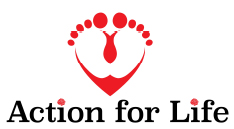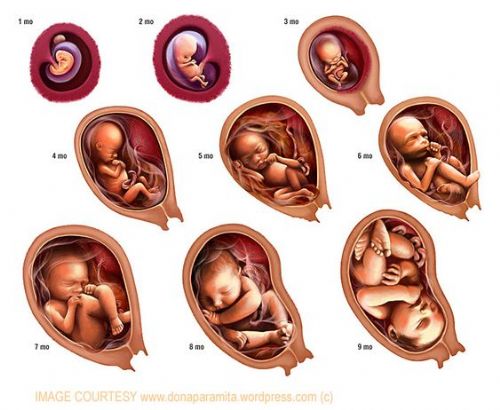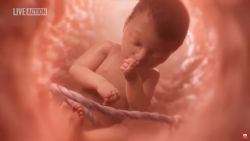A new individual receives 23 chromosomes from each parent. He or she is truly a unique individual human being, never to be repeated. A new person has been created, who at this stage is a tiny living organism weighing only one ten-millionth of a gram. Life begins.
STAGE 1: 0-7 WEEKS
First day of new life: The first cell divides into two, the two into four, and so on. Each of these new cells divides again and again as they travel toward the womb in search of a protected place to grow.
18 days from conception: Heart begins to beat, with the baby's own blood.
28 days: A baby has eyes, ears, and even a tongue!
Muscles are developing along the future spine. Arms and legs are budding.
30 days: Child has grown 10,000 times to 6-7mm (1/4") long. Brain has human proportions. Blood flows in veins.
42 days: Skeleton is formed. Brain coordinates movement of muscles and organs. Reflex responses have begun. Brain waves can be detected, the jaw forms, including teeth and taste buds. The unborn baby begins to swallow amniotic fluid.
Fingers and toes are developing.
45 days: The unborn baby is making body movements, a full 12 weeks before the mother may notice such stirrings. By seven weeks the chest and abdomen are fully formed. Swimming with a natural swimmer's stroke in the amniotic fluid, the baby now looks like a miniature human infant.
44-45 days: Buds of milk teeth appear, and the unborn baby's facial muscles develop. Eyelids begin to form, protecting the developing eyes. Elbows take shape. Internal organs are present, but immature. 99% of muscles are present, each with its own nerve supply.
52 Days: Spontaneous movement begins. The unborn baby then develops a whole collection of moves over the next 4 weeks including hiccuping, frowning, squinting, furrowing the brow, pursing the lips, moving individual arms and legs, head turning, touching his/her face, breathing (without air), stretching, opening the mouth, yawning and sucking.
STAGE 2: 8-11 WEEKS
8 Weeks from conception: Now a small-scale baby, at approximately 3 cm (1 1/8") and weighing a gram (1/30th oz.), yet well proportioned. Every organ is present. Baby's heartbeat is steady. Stomach produces digestive juices. Liver makes blood cells. Kidneys begin to function. Taste buds are forming.
8½ Weeks: The unborn baby's fingerprints are being engraved. Eyelids and palms of hands are sensitive to touch.
8-8 ½ Weeks: Of the 4500 structures in the adult body, 4000 are now present in the unborn baby. The skeleton of the arms and legs and the spine begins to stiffen as bone cells are added.
9 Weeks: The unborn baby will bend fingers around an object placed in his/her palm. Unique fingerprints appear. Thumb sucking may occur.
10 Weeks: The unborn baby's body is sensitive to touch. He/she squints, swallows, puckers up brow and frowns. Eyelids, fingerprints and even fingernails are evident.
11 Weeks: The unborn baby now "practices" breathing, since he/she will have to breathe air immediately after birth. Baby urinates, and stomach muscles can now contract. Vocal chords and taste buds form. Facial expressions and even smiles are evident.
STAGE 3: 12-17 WEEKS
12 Weeks from conception: Though too small to be felt by the mother, the baby reaches peak frequency of movement during the third month. The baby's sex can be visually determined, and the child's eyes, ears and face begin to display distinctive characteristics. He/she can kick, turn feet, curl and fan toes, make a fist, move thumbs, bend wrists, turn head, open mouth and press lips tightly together. The unborn baby is now about 3 inches long, weighing approximately 2 ounces. Fine hair begins to grow on his/her upper lip, chin and eyebrows. The baby swallows and responds to skin stimulations.
13 Weeks: The unborn baby is about 3 inches long, weighing approximately 3 ounces. His/her facial expressions may resemble the parents. The baby is active, but baby is too small for mother to feel anything.
14 Weeks: At this age, the heart pumps several quarts of blood through the body every day. The unborn baby's eyebrows have formed and eye movement can be detected.
15 Weeks: In the growth development of the unborn baby, a wild production of nerve cells begins and continues for a month. A second surge will occur at 25 weeks. By now the baby also has an adult's taste buds.
4 Months: The unborn baby is now only 5 ½ inches long, weighing approximately 5 ounces. He/she is actively moving about inside the safety of the womb. The baby turns, kicks and even somersaults – some of which can now be felt by the mother. Bone marrow is now beginning to form and the unborn baby's heart is pumping 25 quarts of blood a day.
STAGE 4: 18-19 WEEKS
4 1/2 Months from conception: Still very small (less than 8 inches in length), the baby can have dream (REM) sleep. Nostrils and toenails become visible.
4 1/2 Months: The unborn baby's ears are functioning by the end of the 4th month and he/she hears the mother's heartbeat, as well as external noises like music. The baby is also able to experience pain. Life-saving surgery has been successfully performed on babies at this age.
18-20 Weeks: The baby has grown in size approximately 7 ½ inches long and 14 ounces in weight. His/her movements can now be felt by the mother, including the baby's hiccups.
STAGE 5: 20-26 WEEKS
5 Months: Each side of the brain now has a billion nerve cells. If a sound is especially loud, the unborn baby may jump in reaction to it. Thumb-sucking has been observed during the 5th month.
5-6 Months: The unborn baby practices breathing by inhaling amniotic fluid into its developing lungs. The baby will increase seven times in weight and nearly double in height.
6 Months from conception: Fine hair grows on eyebrows and head. Eyelash fringe appears. The unborn baby's weight is about 640g (22 oz.), height 23cm (9"). Babies born at this age have survived.
STAGE 6: 27-32 WEEKS
25-28 Weeks from conception: The unborn baby can recognize his/her mother's voice. The baby is using four of the five senses (vision, hearing, taste, and touch), opens and closes his eyes, and knows the difference between waking and sleeping, and can relate to the moods of the mother.
8 Months: The unborn baby's skin becomes pink and smooth. The pupils of the eye respond to light.
8 Months: The unborn baby's weight increases by 1 kg. (over two pounds) and his/her living quarters inside the mother's womb are becoming cramped.
8 Months: The unborn baby's fingernails reach to the tip of the finger. The skin begins to thicken, with a layer of fat stored underneath for insulation and nourishment.
8 Months: The unborn baby swallows a gallon of amniotic fluid each day and often hiccups. Though movement is limited, due to the cramped quarters the baby's kicks are stronger, and mother may be able to feel an elbow or heel against her abdomen.
STAGE 7: 33+ WEEKS
9 Months (33-40 Weeks) from conception: The baby gains about one-half pound per week as she/he prepares for birth. The bones in the child's head are soft and flexible to more easily mold for the journey down the birth canal. Of the 45 generations of cell divisions before adulthood, 41 have already taken place. Only four more come before adolescence. Ninety percent of a person's development happens in the womb.
References: Milestones of Early Life How you Began Your Journey ° Tanner, J.M., Taylor, G.R., and Editors of Time-Life Books, Growth, New York: Life Science Library, 1965. ° Nilsson, Lennart and Rosenfeld Albert. "Life Before Birth", Life Magazine, April 30, 1965, pg.6-13. ° Carlson B., Human Embryology & Developmental Biology, Toronto, Mosby Publication 3rd edition, 2004. ° Moore K, and Persaud T., The Developing Human, Clinically Oriented Embryology, 6th Edition, Philadelphia: W.B. Saunders, 1998. ° O'Rahilly, R and Muller, F., Human Embryology and Teratology, 3rd Edition, New York, John Wiley and Sons, Inc. 2001. ° Tsiaras, A and Werth, B. From Conception to Birth, a Life Unfolds, New York, Doubleday, 2002. ° "Fetal Development" National Right to Life, from Conception to Birth.




